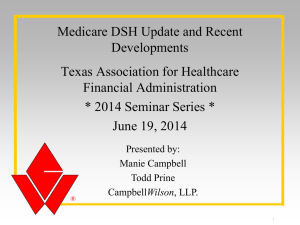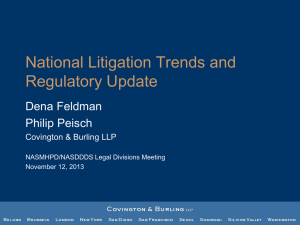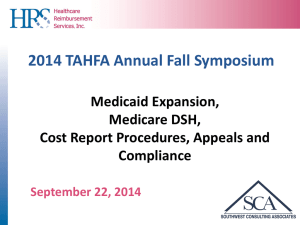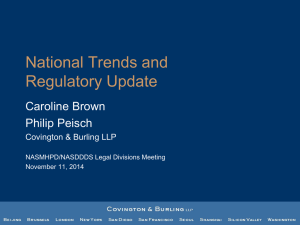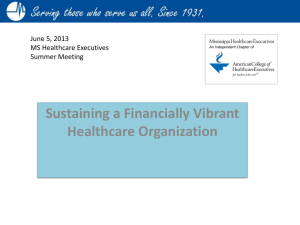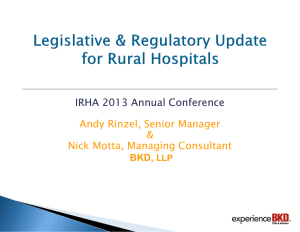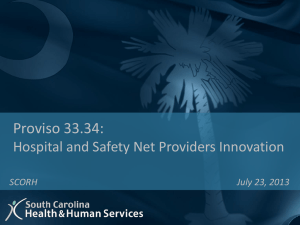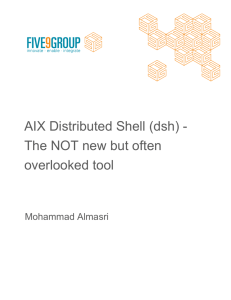The New DSH Formula and Other Recent - Hfma
advertisement
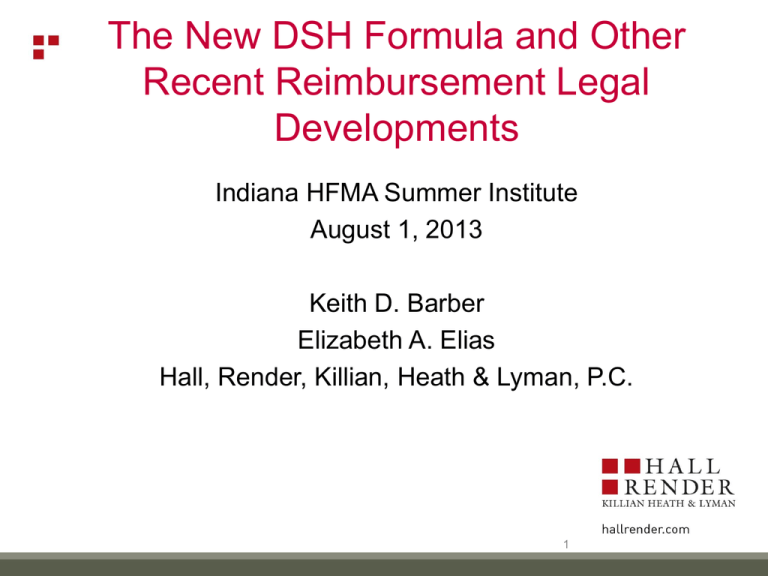
The New DSH Formula and Other Recent Reimbursement Legal Developments Indiana HFMA Summer Institute August 1, 2013 Keith D. Barber Elizabeth A. Elias Hall, Render, Killian, Heath & Lyman, P.C. 1 Topics for Today’s Discussion • • • • • The legal theory of Equitable Tolling reaches the Supreme Ct. Recent PRRB Rule Changes DSH Primer and recent issues impacting DSH reimbursement The Proposed new DSH Rules and Formulas Other Appeal Issues 2 Supreme Court Decision: Sebelius v. Auburn Reg Med Ctr. • • • • Rare Supreme Court Decision on Medicare Reimbursement Decided January 22, 2013 Equitable Tolling for PRRB DSH Appeals of Baystate/SSI Issue Equitable Tolling Rarely Applied Doctrine for Exceptional Circumstances • Court Ruled 9-0 Against Hospitals • 180 Day PRRB Filing Deadline From NPR is Effectively Absolute • Does Not Affect Hall Render Appeals 3 PRRB Rule Updates • New PRRB Rules effective March 1, 2013 • http://www.cms.gov/Regulations-and-Guidance/ReviewBoards/PRRBReview/Downloads/PRRBRules_03_01_2013.pdf • Now, increasingly harder to file cost report appeals • More documentation is required with each filing (NPRs, Audit adjustments, etc.) • PRRB is strict with jurisdictional rules. • It is imperative that hospitals protest appeal items at Line 30, of Wkst E Part A when they file the cost report. 4 Background of Current DSH Appeals: The History of DSH • Established to Compensate for Rigid Effects of IPPS • Hospitals Made Case to Congress Which Directed CMS to Develop DSH Criteria • Secretary of HHS Resisted Implementation • Courts: “Historic Hostility to DSH Program.” • Congress Imposed DSH Formula 5 Background of Current DSH Disputes: The DSH Formula Medicare Fraction Medicare SSI Days Total Medicare Days Medicaid Fraction + Medicaid Days Total Patient Days • CMS Attempts to Deflate the Numerators and Deflate the Denominators • Moving Days From Medicare to Medicaid Fraction • Baystate and the SSI Issue and the Data Match Issue 6 = DPP Background of Current DSH Disputes: Myriad Issues • Current DSH Appeals Are Not One Issue; they are Many Issues • Distinct DSH Issues Must Be Separately Identified and Appealed to the PRRB • PRRB Very Particular Regarding Segregating DSH Issues • Revised NPRs Can Only Reopen for Issue Revised 7 Background of DSH Disputes: Sample Issues • • • • • • • • • SSI Data Match/Revised NPRs Dual Eligible Days (which fraction issue) Tri-Eligible Days (Eligible for SSI, Medicare and Medicaid) Medicare Advantage Days Labor and Delivery Days Observation Days 100 Bed Threshold Cases §1115 Waiver Days Medicaid Eligible Days 8 DSH Cases In Court: Medicaid Eligible Days • Norwalk Hosp Assn. v. Sebelius, Case No. 3:12-cv-01065 (still pending) • Hospital filed appeal to seek inclusion of Medicaid eligible days it found to be subsequently eligible for Medicaid. It had a DSH adjustment but not for the days it sought to add. • PRRB said the hospital could add those days to DSH, but the CMS Administrator reversed. Hospital went to federal court. • Take-away: Need to protest all potentially Medicaid-eligible days, even if you’re not sure of eligibility at the time you file your appeals. 9 DSH Cases In Court: Dual Eligible Days Issue • Issue of which fraction to count patients dually eligible for Medicare and Medicaid but for which Medicare benefits exhausted • We believe the recent cases are distinct and should not affect Hall Render “Tri-Eligible” Cases 10 DSH Cases In Court: Dual Eligible Days Issue There have been a series of Adverse Dual Eligible Court Decisions this year: • Memorial Hospital at Gulfport v. Sebelius, 2012 WL 6054763 (5th Cir.) • Catholic Health Initiatives v. Sebelius, Case No. 12-5092 (D.C. Cir.) • Metropolitan Hospital v. Sebelius, Case No. 11-2465 (6th Cir.) All argue for the inclusion of dual eligible days in the numerator of the Medicaid fraction. 11 DSH Cases In Court: Medicare Advantage Days Issues • Favorable D.C. District Court Decision in Allina v. Sebelius, November 2012 • Well-reasoned decision criticized secretary’s retroactive rulemaking • CMS has appealed, briefs being exchanged • FI letters in NPRs suggest reopening if Allina is ultimately favorable to providers, but don’t trust it. Continue to preserve your appeal rights for this issue 12 DSH Cases: Where is This Going? • Different Issues Likely Produce Different Results; Will Win Some and Lose Some • Different Issues On Different Timelines; Some Comparatively Quick, Others Will Take Time • Continue to Preserve Your Appeal Rights 13 The New DSH Rules • Effective FFY 2014 (October 1, 2013) • All Variables in the DSH are expressly “estimates,” and “proxy” measures are allowed. • Contrasts prior statutorily defined variables and Baystate’s repudiation of estimates not using the “best available data.” • Administrative and judicial review generally barred 14 New DSH Rules: The Basic Calculation • Empirically justified DSH Payments 25% of payments under old DSH formula May be subject to judicial/administrative review • Payment for uncompensated care (only if get EJ-DSH) Factor 1: 75% of DSH payments to all hospitals if formula had not been changed Factor 2: 1-% change in uninsured from 2013 (18%) Factor 3: Hospitals uncompensated care cost ÷ UCC for all hospitals nationwide • First two factors set an uncompensated care pool and third allocates it among hospitals making this part of the DSH calculation revenue neutral 15 New DSH Rules: 2014 Calculations • Empirically justified DSH payments CMS estimates would have been $12.338 billion with no rule change Estimate $12.338 x .25 = $3.085 paid under old formula • Uncompensated care pool Factor 1: $12.338 billion x .75 = $9.2536 billion Factor 2: 0.888 x 9.2535 billion=$8.217 billion uncompensated care pool Step 1: (.16-.18)/18=0.112 Step 2: 1-0.112=0.888 16 New DSH Rules: Factor 3 Conversation to Low Compensation Insured Proxies • Statute says hospitals share of uncompensated care • Considered using charity care and bad debts data from lines 23 and 29 of S-10 • But CMS says these S-10 elements are new and unreliable • May use in later years but not in 2014 • In 2014 will use low compensated care proxies from old DSH formula Medicaid Patient Days Medicare SSI Days 17 Accordingly, CMS Proposes to Convert Factor 3 From This: Uncompensated care costs for the hospital Uncompensated care costs for all DSH hospitals 18 As Measured By: Charity care + bad debt costs for the hospital Charity care + bad debt costs for all hospitals 19 To This: Medicaid patient days + Medicare SSI days for the hospital Medicaid patient days + Medicare SSI days for all hospitals 20 New DSH Rules: Winner and Losers by Factor 3 Reformation • • • • The allocation under Factor 3 is a zero sum game Losers: Hospitals with high bad debts and high charity care Winners: Hospitals with more Medicaid patients Losers: Hospitals in states that refuse to participate in Medicaid expansion Will have less Medicaid, and Presumably more charity care 21 New DSH Rules: Can They Do That? • Statute allows the use of proxies when proxy data is better – Presumably this is not “best available data” • Is this the end of administrative and judicial appeals concerning DSH? – New DSH is supposed to be revenue neutral, so if one hospital is somehow able to appeal, in theory it robs DSH from other hospitals • “There shall be no administrative or judicial review of ….Any estimate of the Secretary for purposes of determining the factors.” 22 Other Appeal Issues: Rural Floor BNA-2 • Same issue most hospitals settled and received payments for last year • Made possible by delayed NPRs • Government delaying negotiations to wrap up “splinter group” hospitals • Any settlement will likely be next year 23 Other Appeal Issues: Rural Floor BNA-2 Jurisdictional Issue • In March, PRRB dismissed non-Hall Render appeal over failure to include BNA as a protested item • None of our appeals have been so challenged yet • Prepared argument that 2008 protest requirement applies only to claimed costs • Other law firm has appealed PRRB’s decision • CMS could have used this argument for many hospitals in BNA-1 and did not • Remains viable issue and all eligible hospitals should enroll 24 Other Appeal Issues: Pension Costs • Wage index issue re: CMS retroactive rulemaking for treatment of pension costs • Related case (from other firm): PRRB decision in March mostly did not rule on substantive issue stating it was bound by Medicare regulations • Our hearing in June 2012, still no decision; expect similar one • We believe the record is favorable for Federal Court review 25 Other Appeal Issues: Low Volume Adjustment (LVA) • The plain language of the statute requires LVA eligibility to be determined based upon a hospital's discharge volume during the respective FFY • Instead, CMS is using old data files. • With expanded eligibility (up to 1600 discharges and 15 miles from nearest PPS hospitals), some hospitals may be missing out on LVA due to CMS’s use of outdated discharge files 26 Questions????? Keith Barber kbarber@hallrender.com (317) 977-1428 Liz Elias eelias@hallrender.com 317-977-1468 1435311 27
